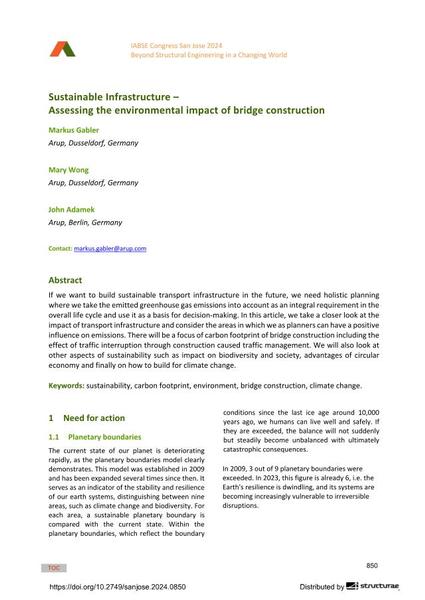Sustainable Infrastructure – Assessing the environmental impact of bridge construction

|
|
|||||||||||
Bibliografische Angaben
| Autor(en): |
Markus Gabler
(Arup, Dusseldorf, Germany)
Mary Wong (Arup, Dusseldorf, Germany) John Adamek (Arup, Berlin, Germany) |
||||
|---|---|---|---|---|---|
| Medium: | Tagungsbeitrag | ||||
| Sprache(n): | Englisch | ||||
| Tagung: | IABSE Congress: Beyond Structural Engineering in a Changing World, San José, Cost Rica, 25-27 Seotember 2024 | ||||
| Veröffentlicht in: | IABSE Congress San José 2024 | ||||
|
|||||
| Seite(n): | 850-857 | ||||
| Anzahl der Seiten (im PDF): | 8 | ||||
| DOI: | 10.2749/sanjose.2024.0850 | ||||
| Abstrakt: |
If we want to build sustainable transport infrastructure in the future, we need holistic planning where we take the emitted greenhouse gas emissions into account as an integral requirement in the overall life cycle and use it as a basis for decision-making. In this article, we take a closer look at the impact of transport infrastructure and consider the areas in which we as planners can have a positive influence on emissions. There will be a focus of carbon footprint of bridge construction including the effect of traffic interruption through construction caused traffic management. We will also look at other aspects of sustainability such as impact on biodiversity and society, advantages of circular economy and finally on how to build for climate change. |
||||
| Stichwörter: |
Nachhaltigkeit Brückenbau Carbon Footprint
|
||||
